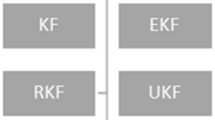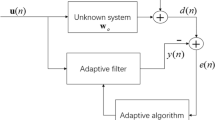Abstract
In this paper, we study the parameter estimation problem of a class of output nonlinear systems and propose a recursive least squares (RLS) algorithm for estimating the parameters of the nonlinear systems based on the model decomposition. The proposed algorithm has lower computational cost than the existing over-parameterization model-based RLS algorithm. The simulation results indicate that the proposed algorithm can effectively estimate the parameters of the nonlinear systems.



Similar content being viewed by others
References
J.C. Agüero, G.C. Goodwin, P.M.J. Van den Hof, A virtual closed loop method for closed loop identification. Automatica 47(8), 1626–1637 (2011)
M. Ahmadi, H. Mojallali, Identification of multiple-input single-output Hammerstein models using Bezier curves and Bernstein polynomials. Appl. Math. Model. 35(4), 1969–1982 (2011)
E.W. Bai, A blind approach to the Hammerstein–Wiener model identification. Automatica 38(6), 967–979 (2002)
E.W. Bai, An optimal two-stage identification algorithm for Hammerstein–Wiener nonlinear systems. Automatica 34(3), 333–338 (1998)
M. Dehghan, M. Hajarian, Fourth-order variants of Newton’s method without second derivatives for solving non-linear equations. Eng. Comput. 29(4), 356–365 (2012)
M. Dehghan, M. Hajarian, Analysis of an iterative algorithm to solve the generalized coupled Sylvester matrix equations. Appl. Math. Model. 35(7), 3285–3300 (2011)
F. Ding, System Identification-New Theory and Methods (Science Press, Beijing, 2013)
F. Ding, System Identification-Performances Analysis for Identification Methods (Science Press, Beijing, 2014)
J. Ding, C.X. Fan, J.X. Lin, Auxiliary model based parameter estimation for dual-rate output error systems with colored noise. Appl. Math. Model. 37(6), 4051–4058 (2013)
J. Ding, J.X. Lin, Modified subspace identification for periodically non-uniformly sampled systems by using the lifting technique. Circuits Syst. Signal Process. 33(5), 1439–1449 (2014)
F. Ding, X.P. Liu, G. Liu, Identification methods for Hammerstein nonlinear systems. Digit. Signal Process. 21(2), 215–238 (2011)
F. Ding, K.P. Deng, X.M. Liu, Decomposition based Newton iterative identification method for a Hammerstein nonlinear FIR system with ARMA noise. Circuits Syst. Signal Process. 33(9), 2881–2893 (2014)
F. Ding, Y.J. Wang, J. Ding, Recursive least squares parameter estimation algorithms for systems with colored noise using the filtering technique and the auxiliary model. Digit. Signal Process. 37, 100–108 (2015)
D. Fan, K. Lo, Identification for disturbed MIMO Wiener systems. Nonlinear Dyn. 55(1–2), 31–42 (2009)
G.C. Goodwin, K.S. Sin, Adaptive Filtering Prediction and Control (Prentice Hall, Englewood Cliffs, 1984)
G.H. Golub, C.F. Van Loan, Matrix Computations, 3rd edn. (Johns Hopkins University Press, Baltimore, 1996)
Y. Gu, F. Ding, J.H. Li, States based iterative parameter estimation for a state space model with multi-state delays using decomposition. Signal Process. 106, 294–230 (2015)
A. Hagenblad, L. Ljung, A. Wills, Maximum likelihood identification of Wiener models. Automatica 44(11), 2697–2705 (2008)
Y.B. Hu, Iterative and recursive least squares estimation algorithms for moving average systems. Simul. Model. Pract. Theory 34, 12–19 (2013)
P.P. Hu, F. Ding, Multistage least squares based iterative estimation for feedback nonlinear systems with moving average noises using the hierarchical identification principle. Nonlinear Dyn. 73(1–2), 583–592 (2013)
Y.B. Hu, B.L. Liu, Q. Zhou, C. Yang, Recursive extended least squares parameter estimation for Wiener nonlinear systems with moving average noises. Circuits Syst. Signal Process. 33(2), 655–664 (2014)
Y.B. Hu, B.L. Liu, Q. Zhou, A multi-innovation generalized extended stochastic gradient algorithm for output nonlinear autoregressive moving average systems. Appl. Math. Comput. 247, 218–224 (2014)
Y. Ji, X.M. Liu, Unified synchronization criteria for hybrid switching-impulsive dynamical networks. Circuits Syst. Signal Process. 34(5), 1499–1517 (2015)
Y. Ji, X.M. Liu et al., New criteria for the robust impulsive synchronization of uncertain chaotic delayed nonlinear systems. Nonlinear Dyn. 79(1), 1–9 (2015)
J.H. Li, Parameter estimation for Hammerstein CARARMA systems based on the Newton iteration. Appl. Math. Lett. 26(1), 91–96 (2013)
X.G. Liu, J. Lu, Least squares based iterative identification for a class of multirate systems. Automatica 46(3), 549–554 (2010)
L. Ljung, System Identification: Theory for the User, 2nd edn. (Prentice Hall, Englewood Cliffs, 1999)
Y.W. Mao, F. Ding, A novel data filtering based multi-innovation stochastic gradient algorithm for Hammerstein nonlinear systems. Digit. Signal Process. 46, 215–225 (2015)
P. Qin, R. Nishii, Z.J. Yang, Selection of NARX models estimated using weighted least squares method via GIC-based method and l1-norm regularization methods. Nonlinear Dyn. 70(3), 1831–1846 (2012)
Y. Shi, T. Chen, Optimal design of multi-channel transmultiplexers with stopband energy and passband magnitude constraints. IEEE Trans. Circuits Syst. II Analog Digit. Signal Process. 50(9), 659–662 (2003)
Y. Shi, B. Yu, Robust mixed H-2/H-infinity control of networked control systems with random time delays in both forward and backward communication links. Automatica 47(4), 754–760 (2011)
Y. Shi, B. Yu, Output feedback stabilization of networked control systems with random delays modeled by Markov chains. IEEE Trans. Autom. Control 54(7), 1668–1674 (2009)
J. Vörös, Modelling and identification of Wiener systems with two-segment nonlinearities. IEEE Trans. Control Syst. Technol. 11(2), 253–265 (2003)
J. Vörös, Modeling and parameter identification of systems with multi-segment piecewise-linear characteristics. IEEE Trans. Autom. Control 47(1), 184–188 (2002)
D.Q. Wang, Least squares-based recursive and iterative estimation for output error moving average systems using data filtering. IET Control Theory Appl. 5(14), 1648–1657 (2011)
D.Q. Wang, F. Ding, Least squares based and gradient based iterative identification for Wiener nonlinear systems. Signal Process. 91(5), 1182–1189 (2011)
X.H. Wang, F. Ding, Convergence of the recursive identification algorithms for multivariate pseudo-linear regressive systems. Int. J. Adapt. Control Signal Process. 30 (2016). doi:10.1002/acs.2642
X.H. Wang, F. Ding, Recursive parameter and state estimation for an input nonlinear state space system using the hierarchical identification principle. Signal Process. 117, 208–218 (2015)
D.Q. Wang, Y.P. Gao, Recursive maximum likelihood identification method for a multivariable controlled autoregressive moving average system. IMA J. Math. Control Inf. (2015). doi:10.1093/imamci/dnv021
D.Q. Wang, H.B. Liu, F. Ding, Highly efficient identification methods for dual-rate Hammerstein systems. IEEE Trans. Control Syst. Technol. 23(5), 1952–1960 (2015)
C. Wang, T. Tang, Recursive least squares estimation algorithm applied to a class of linear-in-parameters output error moving average systems. Appl. Math. Lett. 29, 36–41 (2014)
C. Wang, T. Tang, Several gradient-based iterative estimation algorithms for a class of nonlinear systems using the filtering technique. Nonlinear Dyn. 77(3), 769–780 (2014)
D.Q. Wang, W. Zhang, Improved least squares identification algorithm for multivariable Hammerstein systems. J. Frankl. Inst. Eng. Appl. Math. 352(11), 5292–5370 (2015)
A. Wills, T.B. Schön, L. Ljung, B. Ninness, Identification of Hammerstein–Wiener models. Automatica 49(1), 70–81 (2013)
D.Q. Zhu, X. Hua, B. Sun, A neurodynamics control strategy for real-time tracking control of autonomous underwater vehicles. J. Navig. 67(1), 113–127 (2014)
D.Q. Zhu, H. Huang, S.X. Yang, Dynamic task assignment and path planning of multi-AUV system based on an improved self-organizing map and velocity synthesis method in 3D underwater workspace. IEEE Trans. Cybern. 43(2), 504–514 (2013)
D.Q. Zhu, Q. Liu, Z. Hu, Fault-tolerant control algorithm of the manned submarine with multi-thruster based on quantum behaved particle swarm optimization. Int. J. Control 84(11), 1817–1829 (2012)
Acknowledgments
This work was supported by the National Natural Science Foundation of China (No. 61203111) and the PAPD of Jiangsu Higher Education Institutions.
Author information
Authors and Affiliations
Corresponding author
Rights and permissions
About this article
Cite this article
Ding, F., Wang, X., Chen, Q. et al. Recursive Least Squares Parameter Estimation for a Class of Output Nonlinear Systems Based on the Model Decomposition. Circuits Syst Signal Process 35, 3323–3338 (2016). https://doi.org/10.1007/s00034-015-0190-6
Received:
Revised:
Accepted:
Published:
Issue Date:
DOI: https://doi.org/10.1007/s00034-015-0190-6




